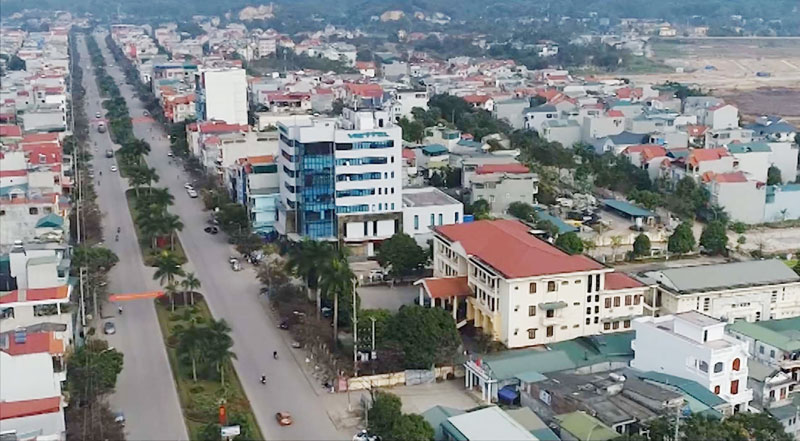
(HBO) - Over the past years, Hoa Binh province has paid special attention to developing urban infrastructure of Hoa Binh city. The face of the city has changed gradually in a cleaner, more spacious and civilised manner.
 A corner of today’s Hoa Binh city.
A corner of today’s Hoa Binh city.
In the 2015-2020
period, the city focused on establishing, supplementing and adjusting urban
planning and detail planning; coordinated and announced a decision approving a
project to adjust Hoa Binh city’s general planning until 2035; set up and
assessed 17 urban planning projects in accordance with the law, made detail
planning at the 1/500 scale for 17 projects with a total area of 922ha, or
20.96 percent; and made the 1/2000 scale planning for four subdivisions, with a
combined area of 2,092ha out of 4,400ha, or 47.5 percent. Up to 100 percent of
new urban areas’ land was zoned out under the 1/2000 scale subdivision
planning.
In the past five
years, Hoa Binh city granted planning licenses to five projects, made public
approved projects, planted landmarks at the site, and strengthened construction
management. The locality also carried out a policy encouraging the involvement
of sectors in urban environmental sanitation, and basically solved the
gathering of garbage on the roadway, with over 90 percent of daily-life garbage
treated.
Attention was also paid
to the urban embellishment, contributing to improving the face of the city,
while the electricity and water systems were upgraded, better meeting locals’
demand.
Hoa Binh city is holding
many opportunities when expanding its administrative boundaries. In the coming
time, the city will focus on directing and making general adjustment plan of
the city; publicising the planting of landmarks in the field in accordance with
the approved planning.
It pledges to create favorable
conditions to attract investors, especially in the fields of urban
infrastructure, transport, electricity, water supply and drainage,
culture-sports, public welfare and in addressing environmental pollution.
Efforts will also be
made to well perform the State management on land and the environment, ensure
traffic safety, and minimise the state of encroaching roadbeds and sidewalks to
use for business activities and market gatherings.
It will strive to
complete all criteria to make it become a tier-II urban city before 2025./.
The Standing Board of the Hoa Binh provincial Party Committee has agreed in principle on a proposal by the Standing Board of the Party Committee of Hoa Binh city to gather feedback on the city’s 1:2000 zoning plan, which forms part of its broader urban development strategy.
Hoa Binh province has made notable progress in public administration reform and digital government development, with the satisfaction index among citizens and businesses reaching over 84%, according to recent government evaluations.
Thanks to great efforts by local authorities in recent times, the governance and public administration performance of Mai Chau district has been significantly improved.
In the afternoon of June 6, the Party Committee, the People's Council, the People's Committee and the Fatherland Front of Lac Son district solemnly held a meeting to celebrate the 139th anniversary of the district's founding (1886–2025) and the 79th anniversary of the establishment of the district's Party Committee (1946–2025). There was the attendance of Mr. Bui Van Thang, the Vice Chairman of the Provincial People's Council; Mr. Quach Tat Liem, the Vice Chairman of the Provincial People's Committee; Ms. Dang Bich Ngoc, the Deputy Head of the National Assembly Delegation of the province; as well as the former leaders of the province and district through various periods, who are the natives of the district.
Implementing the Politburo’s Resolution No. 57-NQ/TW on breakthroughs in science – technology, innovation, and digital transformation is a golden opportunity for the northern mountainous province of Hoa Binh to renew growth model, improve competitive edge and shorten digital gap.
Resolution 57-NQ/TW, issued by the Politburo on December 22, 2024, identifies sci-tech, innovation, and digital transformation as strategic breakthroughs to build a developed and prosperous nation. In Hoa Binh province, this spirit is not just a slogan, it’s being put into action through concrete initiatives that form a "new development triangle”: digital citizenship, digital economy, and digital administration.



 A corner of today’s Hoa Binh city.
A corner of today’s Hoa Binh city.